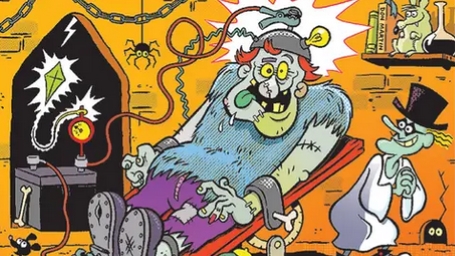CSotD: Don’t Just Do Something, Stand There
Skip to commentsClay Jones gets to represent the large number of cartoons decrying the Democrats’ silent protest at the SOTU for two reasons. One is that he’s a big boy and I’ve complimented him enough times that he won’t get bent out of shape if I disagree with him, and the other is that he attached, as always, an essay explaining his choices.
Which are wrong.
I don’t think holding up auction paddles changed the world, but I also don’t think the Democrats expected it to. I also don’t think Al Green standing up and yelling changed things, either.
Two quick points about that:
- The difference between Green’s demonstration and those of MTG and Lauren Boebert was that they yelled once, while he launched an ongoing interruption. If he’d shouted and sat down, he wouldn’t have been thrown out either. Unclench.
- Stop listing his age. It’s irrelevant unless you think we old folks are less capable than you are. Which perhaps you do but we’re not.
The greater point is this: He accomplished nothing and may have alienated some potential swing voters.

Captain Nolan was appalled at Lord Cardigan’s dithering and shouted at him to advance the Light Brigade, which was very heroic but led to his death and the deaths or wounding of a third of the brigade in the most pointless disaster of a pointless war.
But the Democrats’ silent protest was not a matter of dithering. Rather, it followed a bit of advice from the ’60s:
Don’t just do something. Stand there!
There are times when the urge to do something overrides good sense.
Perhaps the problem is that I’m not a Federalist, or, at least, I’m a pragmatist. But in any case, at the moment, the Democrats in Congress are all but powerless, being the minority in both houses.
I’m also not a socialist, but the co-chair of the Democratic Socialists of America offered a clear vision of what not only needs to happen but is already happening to fight back, and it’s not happening in Congress. It’s happening locally.
It’s happening when people go to town halls and let their national legislators know what they think. It’s happening when they run for local school boards. It’s happening when they go to zoning board meetings and town council meetings, and make their voices heard. It’s happening when they write letters to the editor. And it is happening.
I liked Abbie Hoffman, but raising hell has its limits, and Abbie did his best work in the streets, not in the halls of Congress. To reference another group, Bobby Rush made a good congressman while Eldridge Cleaver would not have, because Rush was an organizer and Cleaver was a showboat.
Right now, what the Democrats need is local grassroots activism and organization, and some serious repositioning on the federal level.
Charlie Sykes cites a poll that shows how Republicans succeeded in misrepresenting Kamala Harris to swing voters, a success made possible by a lack of effective pushback from the Democrats. As he wrote:
An analysis by the Democratic-aligned polling initiative, Blueprint, found that in the final days of the 2024 campaign, swing voters broke for Trump 52% versus just 38% for Harris.

I feel like we’re back in the days of George McGovern, a very nice man and a very bad candidate.
The point isn’t that auction paddles don’t move legislation. It’s that the Democrats, as Sykes says, need to quit appealing to each other and start getting a message out that appeals to independent voters.
Royaards notes the fatigue people are feeling over the bad vibes flowing out of Washington, and he’s right. But if they follow their instinct to disengage, the war is lost.
Think of it this way: Whether you are dealing with a screaming baby or a shying horse, the smart response is the same: Lower your voice and model the mood you seek, because shouting “Calm down, goddammit!” just increases the chaos.
Be Mr. Rogers, not Abbie Hoffman. You want everybody to simmer down, and you also want them to listen and to remain engaged.
Right now, people have no idea which direction they should be heading. As Bok notes, we’re anticipating the weight of tariffs and still suffering the rising costs of groceries and fretting over a plunging stock market.
Juxtaposition of the Day
It’s not necessary to shout and wave canes. It’s becoming obvious, Bennett says, that Dear Leader has no idea what he wants to do, and, as Matson notes, his lack of consistency is tearing us in half.
This is the point at which, Mr. Rogers says, we should look for helpers, and that includes people who calmly assure us that, as Sykes says, “You’re not the crazy ones,” and as Joyce Vance says, “We’re in this together.”
Chaos and indecision can’t be good for anyone, and the anxiety of those caught in the crossfire between Musk’s chainsaw and Trump’s realization that there are limits — as depicted here by Sarah Kempa — is infectious.
What we need to push back against is Kirk Walters’ insistence that caring about other people is torture.
It’s not. It’s compassion. It’s empathy. It’s a psychologically healthy response.
One thing you need to know about grief counseling is that there are a lot of things you can say to the bereft that don’t help, and there are things you can say that make it even worse. Often the best thing you can say is just “I’m so sorry.”
And then stop talking and, instead, listen. Which brings us to our next
Juxtaposition of the Day
Today is International Women’s Day, and both Pett and Glez suggest that perhaps a society in which men are the default would do well to add listening to the celebrations.
Pett dismisses any excuse why we — “we” being the default sex — don’t hear women despite how clear they make their needs and desires, while the dialogue in Glez’s cartoon reads
“Woman, for March 8, here is a trophy of eight kilos!”
“After the holiday, are you going to help me carry it?”
Which is why we don’t listen.
If we did, we might have to pitch in and help.











Comments 7
Comments are closed.